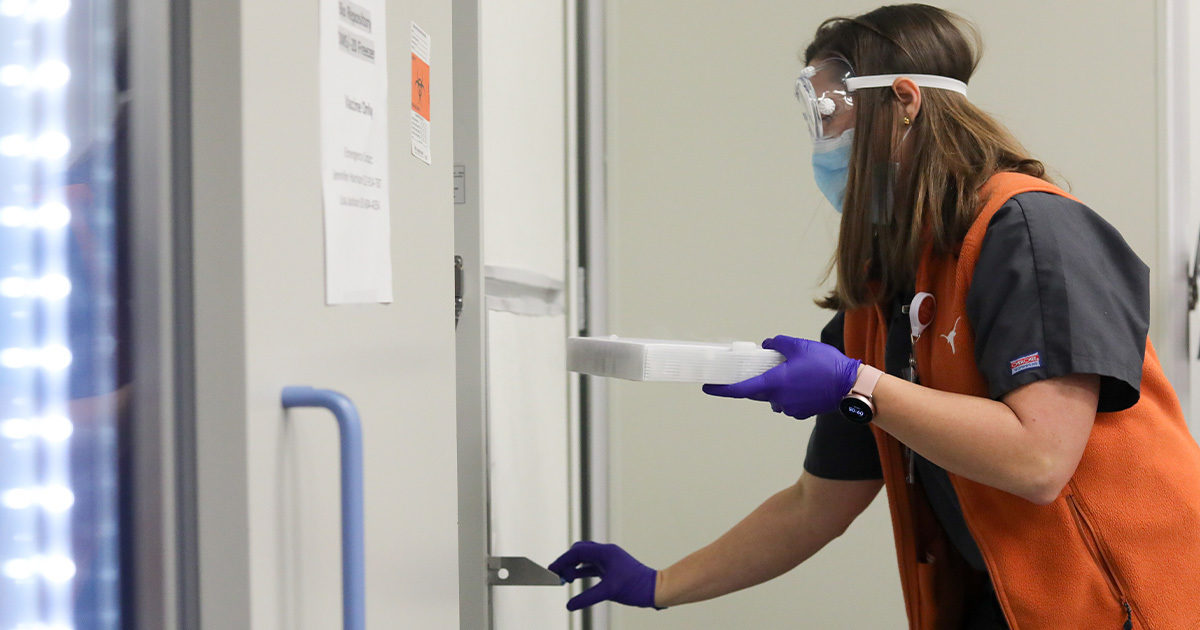First Coronavirus Vaccine Arrives at UT Health Austin
UT Health Austin among the first four medical facilities to receive first round of coronavirus vaccines
Written by: Lauryn Feil

On Monday, December 14, 2020 at 9:30 a.m., UT Health Austin, the clinical practice of the Dell Medical School at The University of Texas at Austin, was the first Central Texas medical facility to receive the first round of the Pfizer coronavirus vaccine and began administering vaccinations to frontline healthcare personnel starting the morning of Tuesday, December 15, 2020.
The Texas Department of State Health Services confirmed that UT Health Austin was one of four facilities statewide to receive the first shipment of Pfizer vaccines. Other facilities include MD Anderson Cancer Center in Houston, Methodist Dallas Medical Center, and Wellness 360 at UT Health San Antonio. Another 19 facilities received shipments on Tuesday, December 15, 2020, and by the end of the week, more than 220,000 of Pfizer’s doses will have arrived in 109 hospitals across 34 Texas counties.
“Today is a very exciting day here at The University of Texas at Austin and UT Health Austin. We received our first shipment of the COVID-19 vaccine from Pfizer this morning. We have been working diligently over the last week to ensure that we have our plans and processes in place to vaccinate healthcare providers here at UT Health Austin. This is our community’s and the world’s first step towards combatting this virus,” says Amy Young, MD, Chief Clinical Officer for UT Health Austin and Vice Dean of Professional Practice for the Dell Medical School.
The arrival of the vaccine in Texas comes as intensive care unit beds across the state are in short supply and COVID-19 hospitalizations have reached their highest point since July 31, 2020. Eight hospital regions throughout the State of Texas are under heightened restrictions due to COVID-19 patients making up more than 15% of their total hospital capacity.
“We anticipate that over the next 10 days that we will vaccinate approximately 2,900 healthcare providers that are on the state tiers for priority. This includes physicians at UT Health Austin and the Dell Medical School as well as residents and medical students that also provide care,” says Dr. Young.
The Pfizer coronavirus vaccine is an mRNA vaccine, which means that instead of delivering a virus or a viral protein to the body, the RNA vaccine delivers genetic information that allows the body’s own cells to produce a viral protein. Synthetic mRNA that encodes a viral protein can borrow this machinery to produce many copies of the protein. These proteins stimulate the immune system to mount a response, without posing any risk of infection and very minimal side effects, if any occur at all.
The vaccine requires two doses, the second dose being administered approximately three weeks after the first. The second dose of vaccines will be administered to healthcare personnel who opt to get vaccinated in this first round and is expected to arrive at UT Health Austin in January, 2021. After vaccinating frontline healthcare personnel, UT Austin and UT Health Austin will follow the CDC and Texas Department of State Health Services recommendations on distribution of the vaccine to other populations throughout the community.
UT Health Austin and the Dell Medical School have been in collaboration with various departments and researchers across campus, including the McLellan Lab where researchers contributed vital new knowledge that was an important part of the vaccine’s development, and the UT Austin COVID-19 Modeling Consortium, which has helped keep the UT Austin community up-to-date on the effects of COVID-19 throughout the city of Austin.
“We have been planning for this exact day and this exact moment since at least the beginning of November and finally receiving the vaccines was really a very surreal moment. We are excited to be a part of history today and understand that such a small box is so important and pivotal in our country at this very moment,” says Jennifer Harrison, RN, Senior Director of Clinical Operations at UT Health Austin and the Dell Medical School.
“The vaccine is coming, but it still does not diminish our responsibility individually and societally to continue the practices that we know that are helpful in reducing the spread of COVID-19, including masking, social distancing, and staying six feet apart. We all need to work together in this, as it’s still really important that we try to keep COVID-19 cases to a minimum as we try to increase the immunity of our population,” says Dr. Young.
Here’s a breakdown of which facilities and counties in Central Texas will receive the first doses of the Pfizer vaccine during the first week of distribution:
Travis County
- Seton Medical Center – 2,925 doses
- Dell Children’s Medical Center of Central Texas – 1,950 doses
- South Austin Medical Center – 975 doses
- Dell Seton Medical Center – 1,950 doses
- UT Health Austin (at the Dell Medical School) – 2,925 doses
- Austin State Hospital – 975 doses
- North Austin Medical Center – 975 doses
- St. David’s Medical Center – 975 doses
Williamson County
- Round Rock Medical Center – 975 doses
- Baylor Scott and White Health Medical Center Round Rock – 975 doses
Hays County
- Seton Medical Center Hays – 975 doses
To see how the first week’s shipment of vaccines is being allocated across Texas, visit the Department of State Health Services website
.For all UT Health Austin resources related to COVID-19, click here.